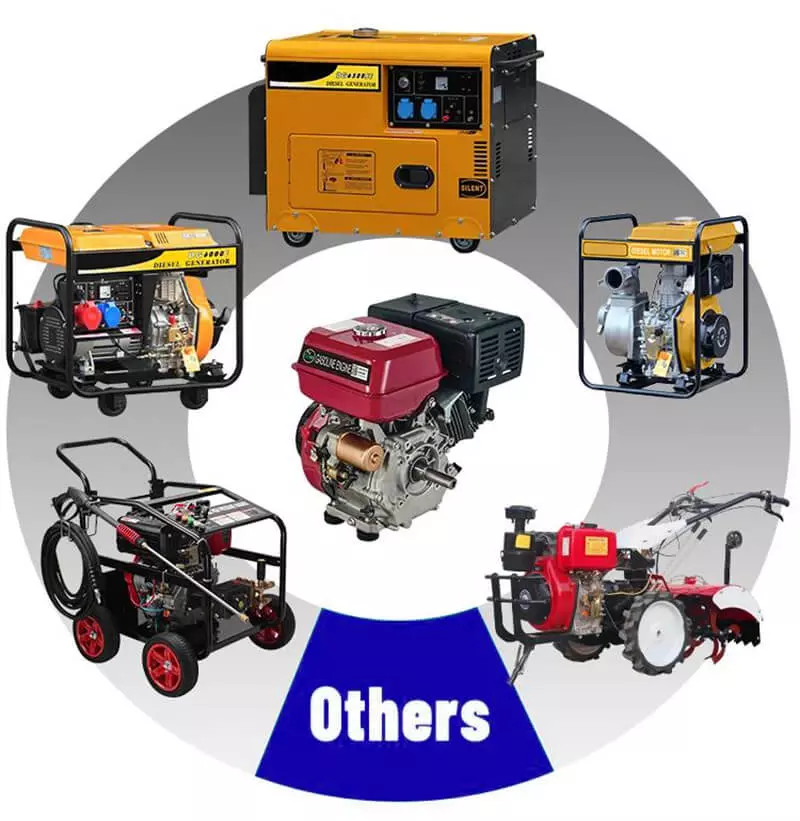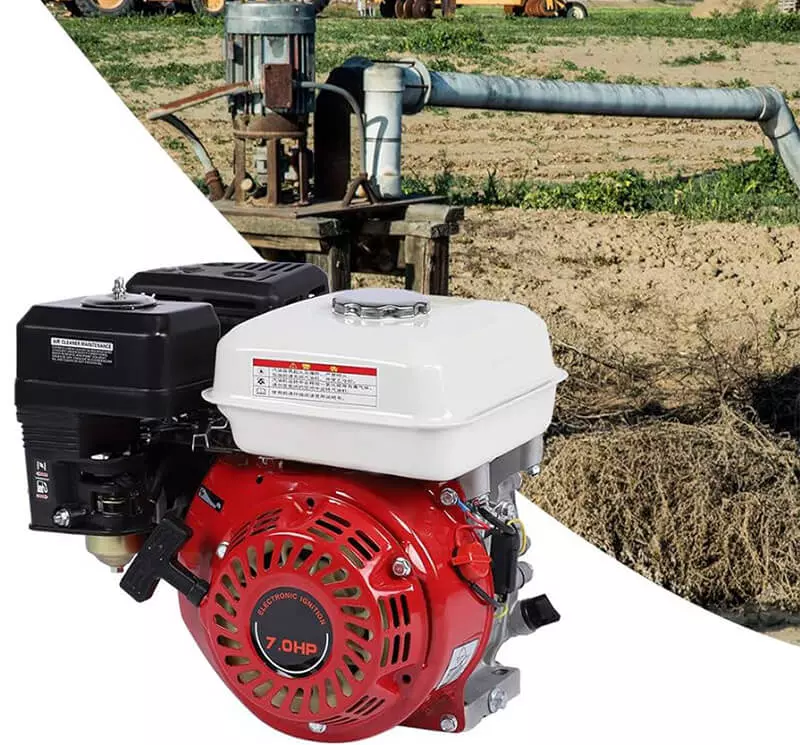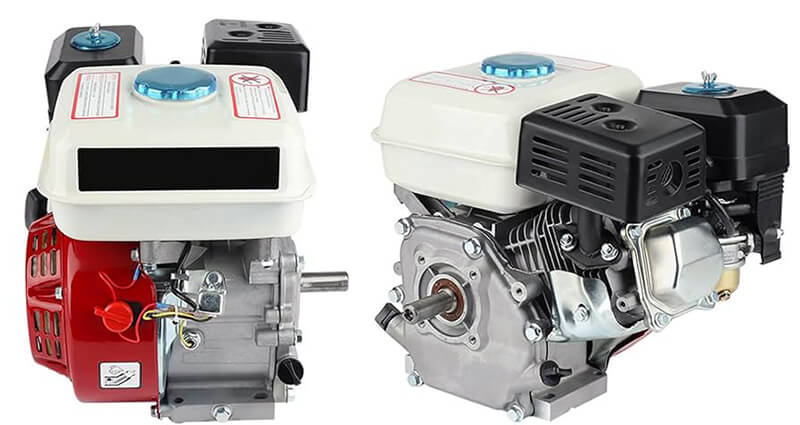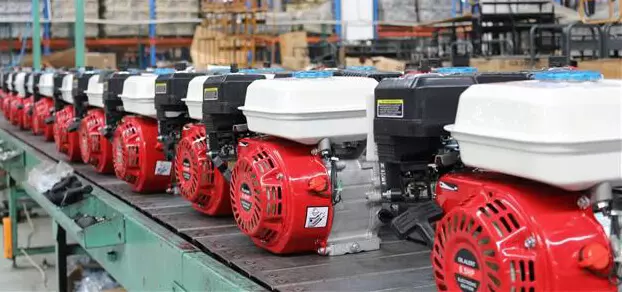As a premier manufacturer and supplier, BISON is proud to provide high-quality solutions to meet your diverse small engine needs. Every engine we produce ensures optimal performance, durability and efficiency, focusing on delivering high quality air-cooled engines.
Explore our range of small air-cooled engines and experience the BISON difference.
contact BISON
Their portability, simplicity, and reliability render small air cooled engines versatile, finding application in a variety of scenarios:
Simple and easy to maintain: Air cooled engines are simpler in design than liquid-cooled engines and require fewer parts to maintain. This makes them easier to maintain and repair, and often reduces maintenance costs.

In the engine world, small air cooled engines stand out for their practicality and versatility. It's needed for a variety of agricultural tools, from lawn mowers to portable generators. Choosing the right air cooled engine for your equipment is critical. While incorrect air cooled engine may lead to subpar outcomes, heightened expenses, or even untimely setbacks, all of which have potential to affect the success of your project or business. Yet, opting for this decision is not a simple process, necessitating the consideration of various crucial elements. Such as the intricate details of power and performance, including not only horsepower and torque for the workload, but also durability and reliability. Fuel consumption and emission levels are not only ecological concerns but also factors that seriously impact operating costs and regulatory compliance. Ease of use and maintenance are also crucial as they determine your ongoing relationship with your engine......
After reading this guide, you'll have the insights you need to make informed decisions that ensure your engine isn't just a purchase, but a long-term asset that increases your efficiency and effectiveness. Let's begin our journey to find a small air cooled engine.
Before we delve into the key factors that influence your purchase of a small air cooled engine, let’s get a clear understanding of what these engines are. Small air cooled engines, as the name suggests, rely on air as the main cooling medium to dissipate the heat generated during operation. Unlike liquid cooled engines, which utilize a circulating coolant system, air cooled engines have fins and other heat-dissipating structures that promote efficient cooling through natural airflow.
The simple design of air cooled engines often results in lighter and more compact units. Maintaining them is generally simpler due to their fewer components and the absence of intricate cooling systems.
Liquid cooled engines, on the other hand, use coolant that circulates through channels within the engine block to absorb and remove heat. This approach allows for more precise temperature control, making liquid cooled engines suitable for sustained high-performance applications. For more differences, visit Air cooled vs liquid cooled engines.
Now that we understand these basic but important differences, let's begin a comprehensive exploration of key considerations so you can make an informed and impactful decision.

Choosing a small air cooled engine with the correct specifications is critical to ensuring optimal performance. Critical specifications including engine displacement(cc), and power output (horsepower or kilowatts), must align with the intended purpose of the device. More is not always better, while Less is not always bad. An oversized small air-cooled engine may result in unnecessary fuel consumption, while an underpowered engine may perform poorly and wear out quickly. Also, consider the engine's torque curve, which should match the application. For example, equipment that requires a lot of power at low speeds will benefit from an engine with strong low-end torque.
Starting the system is a major factor affecting user convenience. Traditional recoil starting systems require a manual pull to start gasoline engine, providing a simple and lightweight solution. Electric start systems, meanwhile, make it easy to start an air cooled engine with the push of a button, but add weight and complexity. Choosing between the two often involves a trade-off between ease of use and system simplicity.
The longevity of an air-cooled engine largely depends on its build quality and design. Evaluating the reputations of different manufacturers can guide you in choosing a durable engine. Consider the materials used, the sturdiness of the engine components, and the thermal efficiency of the cooling system. Comprehensive warranty coverage and support further demonstrate the manufacturer's commitment to reliability.
In an increasingly eco-conscious world, it is crucial to consider the fuel consumption and emission levels of small air-cooled engines. In addition to the environmental impact, efficient fuel use is also economical in the long run. When it comes to fuel types, understand the impact of using standard fuel blended with ethanol, which can affect engine performance and durability. Compliance with emission standards and certification should also be consistent with local regulations and personal environmental values.
Small air-cooled engines should be user-friendly, with a starting mechanism that is reliable and suitable for the operator's capabilities. Maintenance requirements and service intervals indicate the amount of maintenance required to ensure service life, while parts availability and ease of repair help improve the overall convenience and downtime of the machines you drive.
Consider the physical dimensions of the air-cooled engine to ensure it will fit the intended equipment without extensive modifications. Engine weight is also a critical factor, especially for portable equipment, as it directly affects overall portability and handling.
Conduct research on the manufacturer's track record and standing within the industry. Read customer reviews and look for testimonials to gauge post-purchase satisfaction. In addition, the availability and coverage of the manufacturer's support and service network are critical for resolving future issues or procuring spare parts.
By carefully considering these seven key factors, purchasers can navigate the complexities of selecting the right small air-cooled engine. Beyond these fundamental considerations, aspects like noise levels, vibrations, and compatibility with accessories may prove significant, contingent on the particular application and the preferences of the operator. Remember, our goal is not just to purchase an engine, but to invest in one that will provide performance, reliability and value for years to come.

Amidst the myriad specifications, designs, and brands available in the market, delving into the realm of small air cooled engines can be a perplexing endeavor. However, I believe that through this guide, after understanding the impact of several key factors such as engine displacement, power output, durability and reliability, fuel consumption and emissions, and the reputation of the manufacturer, we will be able to better choose the air cooled engine.
Are you ready to make decisions that ensure top-notch quality and unmatched performance? Contact BISON small air-cooled engine now. Our team of experts is on hand to help you find the perfect match for your unique needs.
table of contents
Choose BISON air cooled engines for superior performance and unbeatable wholesale value
contact BISON